(完整word版)高中英语语法一般现在时
- 格式:doc
- 大小:57.51 KB
- 文档页数:5
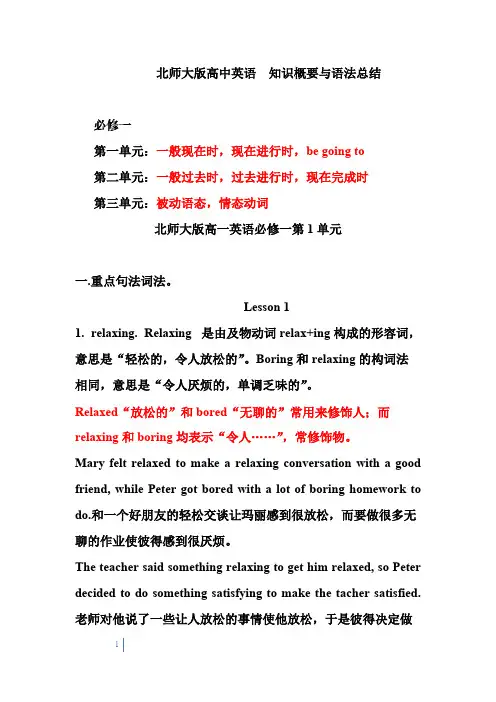
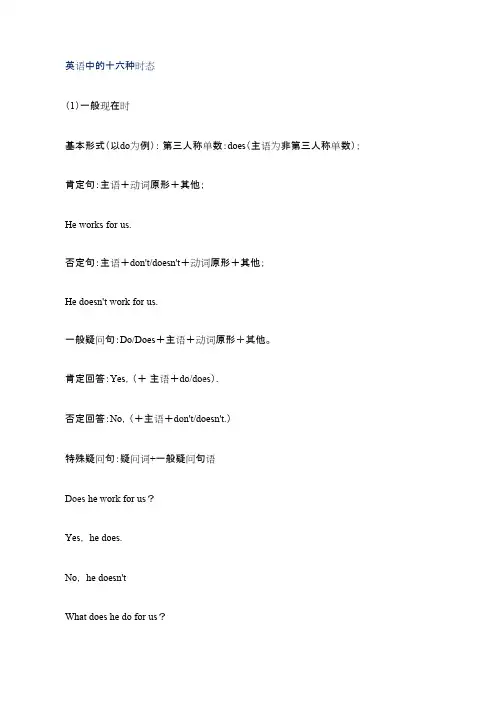
英语中的十六种时态(1)一般现在时基本形式(以do为例):第三人称单数:does(主语为非第三人称单数);肯定句:主语+动词原形+其他;He works for us.否定句:主语+don't/doesn't+动词原形+其他;He doesn't work for us.一般疑问句:Do/Does+主语+动词原形+其他。
肯定回答:Yes,(+主语+do/does).否定回答:No,(+主语+don't/doesn't.)特殊疑问句:疑问词+一般疑问句语Does he work for us?Yes, he does.No, he doesn'tWhat does he do for us?He works for us.(2)一般过去时be动词+行为动词的过去式否定句式:在行为动词前加didn't,同时还原行为动词,或was/were+not;was或were放于句首;用助动词do的过去式did提问,同时还原行为动词例如: Did he work for us?He didn't work for us.He worked for us.(3)一般将来时am/are/is+going to+do 或will/shall+doam/is/are/about to + doam/is/are to + do;一般将来时的表达方法be going to +动词原形be +不定式,be to+动词原形,be about to +动词原形be able to +不定式be about to+动词原形will + 动词原形;例如:He is going to work for us.He will work for us;He is coming.这是特殊的用一般现在时表达将来时态的例子!!(4)过去将来时be(was,were)going to+动词原形be(was,were)about to+动词原形be(was,were)to+动词原形肯定句:主语+be(was,were)going to+动词原形~.否定句:主语+be(was,were)not going to+动词原形~.疑问句:Be(Was,Were)+主语+going to+动词原形~?肯定句:主语+would(should)+动词原形~.否定句:主语+would(should)not+动词原形~.疑问句:Would(Should)+主语+动词原形~?He would work for us.(5)现在进行时主语+be+v.ing〔现在分词〕形式(其中v表示动词)表示现在正在进行的动作或最近在做的事。
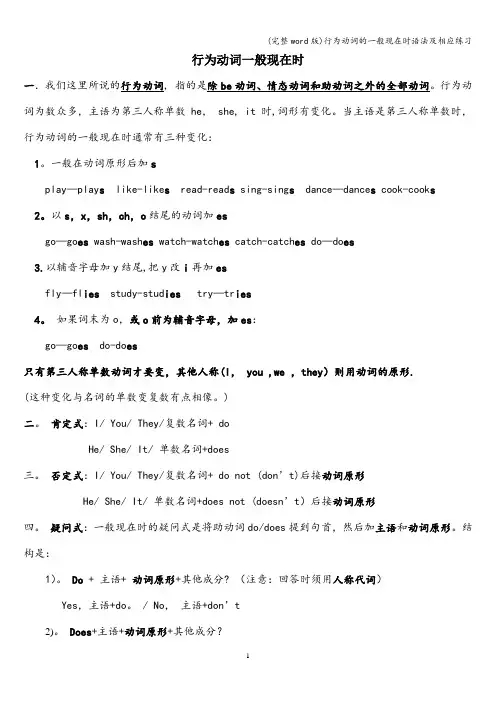
行为动词一般现在时一.我们这里所说的行为动词, 指的是除be动词、情态动词和助动词之外的全部动词。
行为动词为数众多,主语为第三人称单数he, she, it时,词形有变化。
当主语是第三人称单数时,行为动词的一般现在时通常有三种变化:1。
一般在动词原形后加splay—play s like-like s read-read s sing-sing s dance—dance s cook-cook s2。
以s,x,sh,ch,o结尾的动词加esgo—go es wash-wash es watch-watch es catch-catch es do—do es3.以辅音字母加y结尾,把y改i再加esfly—fl ies study-stud ies try—tr ies4。
如果词末为o,或o前为辅音字母,加es:go—go es do-do es只有第三人称单数动词才要变,其他人称(I, you ,we ,they)则用动词的原形.(这种变化与名词的单数变复数有点相像。
)二。
肯定式:I/ You/ They/复数名词+ doHe/ She/ It/ 单数名词+does三。
否定式:I/ You/ They/复数名词+ do not (don’t)后接动词原形He/ She/ It/ 单数名词+does not (doesn’t)后接动词原形四。
疑问式:一般现在时的疑问式是将助动词do/does提到句首,然后加主语和动词原形。
结构是:1)。
Do + 主语+ 动词原形+其他成分? (注意:回答时须用人称代词)Yes,主语+do。
/ No,主语+don’t2)。
Does+主语+动词原形+其他成分?Yes,主语+does。
/ No, 主语+doesn’t.(注意:回答时须用人称代词)五. 那么,什么情况下用行为动词的一般现在时呢?当这个动作经常发生或表示习惯性的动作时,通常用一般现在时,它经常与表示频度的时间状语连用,如,当句子中有every day every year ,on Sunday, in the morning ,often, sometimes,usually, at one o’clock等词时,用一般现在时。

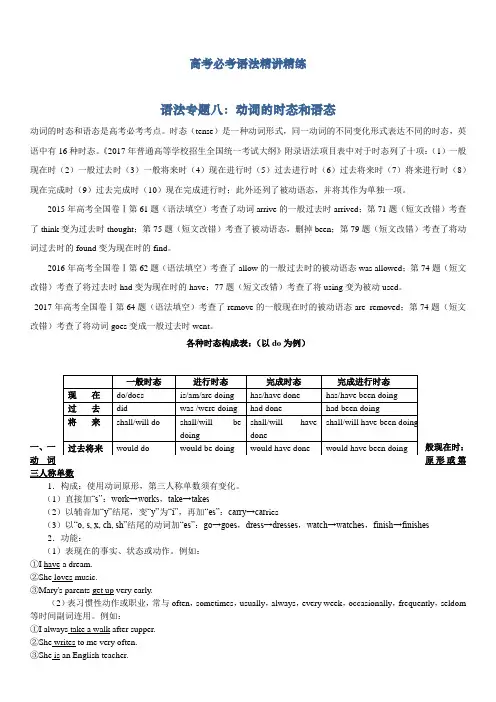
高考必考语法精讲精练语法专题八:动词的时态和语态动词的时态和语态是高考必考考点。
时态(tense)是一种动词形式,同一动词的不同变化形式表达不同的时态,英语中有16种时态。
《2017年普通高等学校招生全国统一考试大纲》附录语法项目表中对于时态列了十项:(1)一般现在时(2)一般过去时(3)一般将来时(4)现在进行时(5)过去进行时(6)过去将来时(7)将来进行时(8)现在完成时(9)过去完成时(10)现在完成进行时;此外还列了被动语态,并将其作为单独一项。
2015年高考全国卷Ⅰ第61题(语法填空)考查了动词arrive的一般过去时arrived;第71题(短文改错)考查了think变为过去时thought;第75题(短文改错)考查了被动语态,删掉been;第79题(短文改错)考查了将动词过去时的found变为现在时的find。
2016年高考全国卷Ⅰ第62题(语法填空)考查了allow的一般过去时的被动语态was allowed;第74题(短文改错)考查了将过去时had变为现在时的have;77题(短文改错)考查了将using变为被动used。
2017年高考全国卷Ⅰ第64题(语法填空)考查了remove的一般现在时的被动语态are removed;第74题(短文改错)考查了将动词goes变成一般过去时went。
各种时态构成表:(以do为例)一、一般现在时:动词原形或第三人称单数1.构成:使用动词原形,第三人称单数须有变化。
(1)直接加“s”:work→works,take→takes(2)以辅音加“y”结尾,变“y”为“i”,再加“es”:carry→car ries(3)以“o, s, x, ch, sh”结尾的动词加“es”:go→goes,dress→dresses,watch→watches,finish→finishes2.功能:(1)表现在的事实、状态或动作。
例如:①I have a dream.②She loves music.③Mary's parents get up very early.(2)表习惯性动作或职业,常与often,sometimes,usually,always,every week,occasionally,frequently,seldom 等时间副词连用。
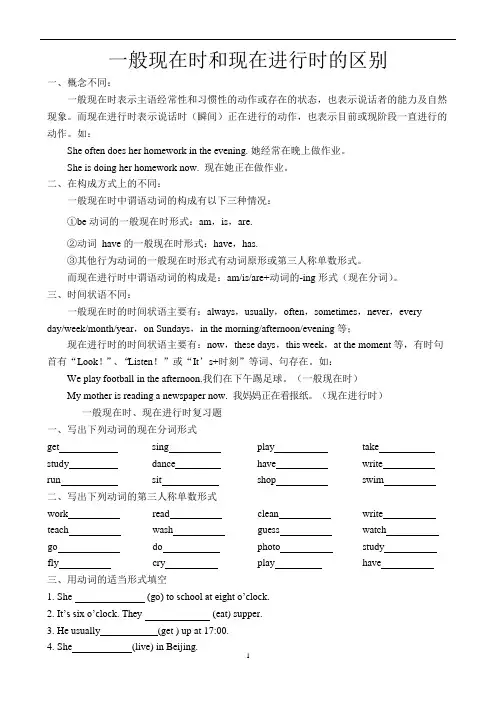
一般现在时和现在进行时的区别一、概念不同:一般现在时表示主语经常性和习惯性的动作或存在的状态,也表示说话者的能力及自然现象。
而现在进行时表示说话时(瞬间)正在进行的动作,也表示目前或现阶段一直进行的动作。
如:She often does her homework in the evening. 她经常在晚上做作业。
She is doing her homework now. 现在她正在做作业。
二、在构成方式上的不同:一般现在时中谓语动词的构成有以下三种情况:①be 动词的一般现在时形式:am,is,are.②动词have 的一般现在时形式:have,has.③其他行为动词的一般现在时形式有动词原形或第三人称单数形式。
而现在进行时中谓语动词的构成是:am/is/are+动词的-ing 形式(现在分词)。
三、时间状语不同:一般现在时的时间状语主要有:always,usually,often,sometimes,never,everyday/week/month/year,on Sundays,in the morning/afternoon/evening 等;现在进行时的时间状语主要有:now,these days,this week,at the moment 等,有时句首有“Look!”、“Listen!”或“It’s+时刻”等词、句存在。
如:We play football in the afternoon.我们在下午踢足球。
(一般现在时)My mother is reading a newspaper now. 我妈妈正在看报纸。
(现在进行时)一般现在时、现在进行时复习题一、写出下列动词的现在分词形式get study run singdancesitplayhaveshoptakewriteswim二、写出下列动词的第三人称单数形式work read clean write teach wash guess watch go do photo study fly cry play have 三、用动词的适当形式填空1.She2.It’s six o’clock. They (go) to school at eight o’clock.(eat) supper.3.He usually (get ) up at 17:00.5、I (want) to do homework now.6、My father always (come) back from work very late.7、The teacher is busy. He (sleep) six hours a day.8、Listen! Jane (sing) in the classroom. She often (sing) there.9、your brother (know) Japanese?10、Where you (have) lunch every day?11、The girl (like) wearing a skirt. Look! She (wear) a red skirt today.12、It's time (go) to school13、you (clean)the blackboard now?14、Let's (go)and help her.15、What are they doing? They (put)things away.16、He often (have)supper at 6:00 in the evening.17、It’s 6 o’clock in the morning. He .(get)up.18、Tom (have) an English class now.13.Listen! The girl (sing)in the room.14.I (read)a book in the room at the moment.16.Where he (come)from?17.Who (sing)over there now?18、Listen! The baby (cry)in the next room.19、Look! The twins (wear)new sweaters.20、Don’t talk here. Grandparents _ (sleep).21、Mrs Read (clean)the windows every day.22.、On Sunday he sometimes (wash)his clothes and sometimes (do)some shopping.23、The twins usually (have)milk and bread for breakfast, but Jim (have)some coffee for it.24、---What you (do)? ---I (make) cakes.25、Sometimes she (watch) TV.26、Now she (watch) TV. Jim, my good friend, (be) sixteen years old.27、There (be) some books and pens on the desk.28、Mrs White (teach) English. She (teach) English now.29、--- you (make) a model plane? ---Yes, I am.30、---How you (like) China? ---I (like) China very much。
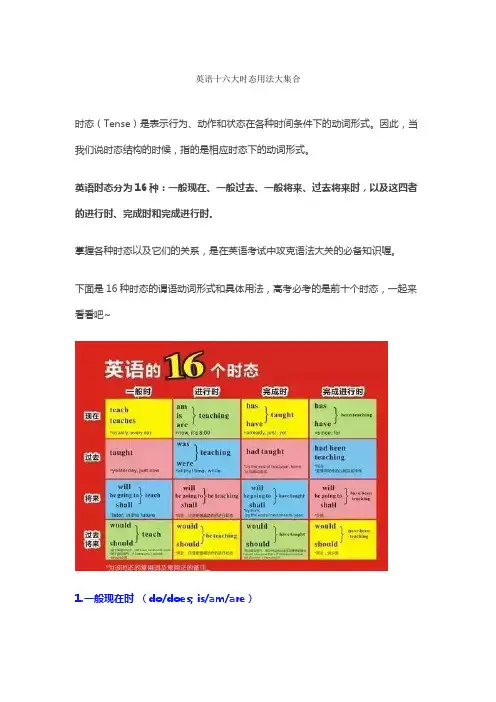
英语十六大时态用法大集合时态(Tense)是表示行为、动作和状态在各种时间条件下的动词形式。
因此,当我们说时态结构的时候,指的是相应时态下的动词形式。
英语时态分为16种:一般现在、一般过去、一般将来、过去将来时,以及这四者的进行时、完成时和完成进行时。
掌握各种时态以及它们的关系,是在英语考试中攻克语法大关的必备知识喔。
下面是16种时态的谓语动词形式和具体用法,高考必考的是前十个时态,一起来看看吧~1.一般现在时(do/does; is/am/are)①表示现在的情况、状态或特征。
例:He is a student.他是一个学生。
②表示经常性、习惯性动作。
例:He always helps others.他总是帮助别人。
③客观事实和普遍真理。
例:The earth moves the sun.地球绕着太阳转。
④表示一个按规定、计划或安排要发生的动作。
仅限于某些表示“来、去、动、停、开始、结束、继续”等的动词,可以与表示未来时间的状语搭配使用。
常见的用法是:飞机、火车、轮船、汽车等定期定点运行的交通方式。
例:The next train leaves at 3 o'clock this afternoon.下一趟火车今天下午3点开车。
⑤在时间、条件和让步状语从句中经常用一般现在(有时也用现在完成时)表示将的来事情。
(即:主将从现原则)例:I will call you as soon as I arrive at the airport.我一到机场就会给你打电话。
When you have finished the report, I will have waited for about 3 hours. 等你完成这份报告的时候,我就已经等了将近3个小时了。
2. 现在进行时(am/is/are doing)①表示此时此刻正在发生的事情。
例:He is listning to the music now.他现在正在听音乐。
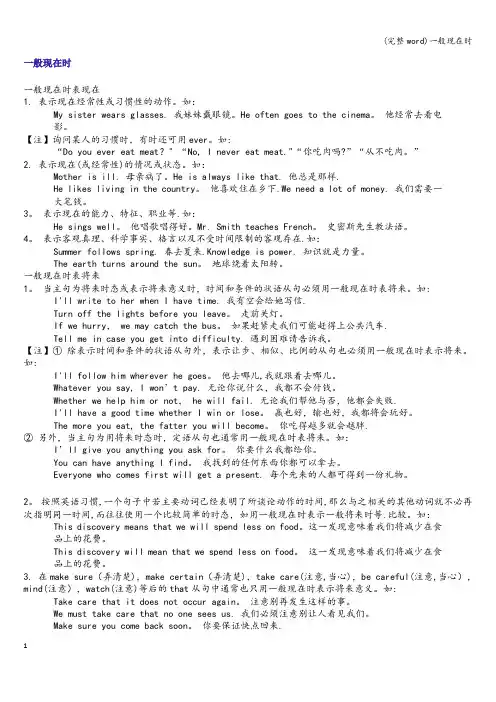
一般现在时一般现在时表现在1. 表示现在经常性或习惯性的动作。
如:My sister wears glasses. 我妹妹戴眼镜。
He often goes to the cinema。
他经常去看电影。
【注】询问某人的习惯时,有时还可用ever。
如:“Do you ever eat meat?" “No, I never eat meat."“你吃肉吗?”“从不吃肉。
”2. 表示现在(或经常性)的情况或状态。
如:Mother is ill. 母亲病了。
He is always like that. 他总是那样.He likes living in the country。
他喜欢住在乡下.We need a lot of money. 我们需要一大笔钱。
3。
表示现在的能力、特征、职业等.如:He sings well。
他唱歌唱得好。
Mr. Smith teaches French。
史密斯先生教法语。
4。
表示客观真理、科学事实、格言以及不受时间限制的客观存在.如:Summer follows spring. 春去夏来.Knowledge is power. 知识就是力量。
The earth turns around the sun。
地球绕着太阳转。
一般现在时表将来1。
当主句为将来时态或表示将来意义时,时间和条件的状语从句必须用一般现在时表将来。
如: I'll write to her when I have time. 我有空会给她写信.Turn off the lights before you leave。
走前关灯。
If we hurry, we may catch the bus。
如果赶紧走我们可能赶得上公共汽车.Tell me in case you get into difficulty. 遇到困难请告诉我。
【注】① 除表示时间和条件的状语从句外,表示让步、相似、比例的从句也必须用一般现在时表示将来。
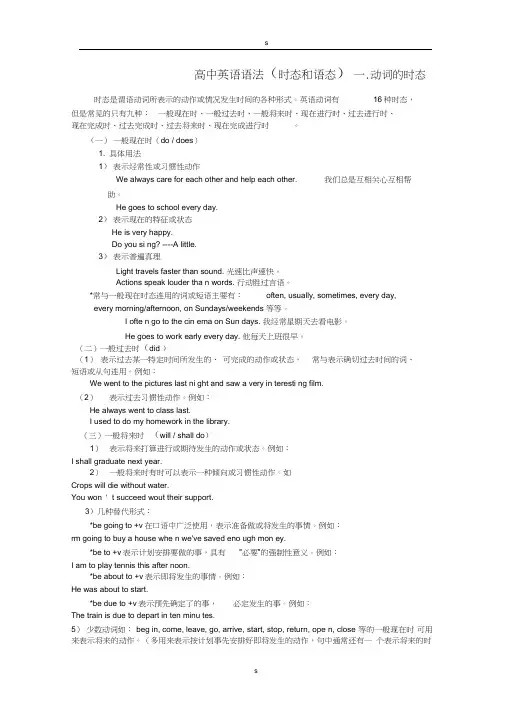
高中英语语法(时态和语态)一.动词的时态时态是谓语动词所表示的动作或情况发生时间的各种形式。
英语动词有16种时态,但是常见的只有九种:一般现在时、一般过去时、一般将来时、现在进行时、过去进行时、现在完成时、过去完成时、过去将来时、现在完成进行时。
(一)一般现在时(do / does)1. 具体用法1)表示经常性或习惯性动作We always care for each other and help each other. 我们总是互相关心互相帮助。
He goes to school every day.2)表示现在的特征或状态He is very happy.Do you si ng? ----A little.3)表示普遍真理Light travels faster than sound. 光速比声速快。
Actions speak louder tha n words. 行动胜过言语。
*常与一般现在时态连用的词或短语主要有:often, usually, sometimes, every day,every morning/afternoon, on Sundays/weekends 等等。
I ofte n go to the cin ema on Sun days. 我经常星期天去看电影。
He goes to work early every day. 他每天上班很早。
(二)一般过去时(did )(1)表示过去某一特定时间所发生的、可完成的动作或状态,常与表示确切过去时间的词、短语或从句连用。
例如:We went to the pictures last ni ght and saw a very in teresti ng film.(2)表示过去习惯性动作。
例如:He always went to class last.I used to do my homework in the library.(三)一般将来时(will / shall do)1)表示将来打算进行或期待发生的动作或状态。
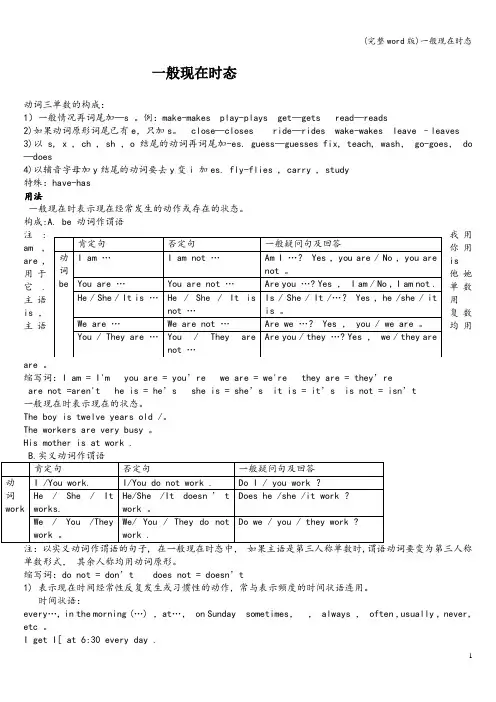
一般现在时态动词三单数的构成:1)一般情况再词尾加—s 。
例:make-makes play-plays get—gets read—reads2)如果动词原形词尾已有e,只加s。
close—closes ride—rides wake-wakes leave –leaves3)以s, x , ch , sh ,o 结尾的动词再词尾加-es. guess—guesses fix, teach, wash, go-goes, do —does4)以辅音字母加y结尾的动词要去y变i 加es. fly-flies , carry , study特殊:have-has用法一般现在时表示现在经常发生的动作或存在的状态。
构成:A. be 动词作谓语注: 我用Array am , 你用are , is用于他她它.单数主语用is ,复数主语均用are 。
缩写词:I am = I'm you are = you’re we are = we're they are = they’reare not =aren't he is = he’s she is = she’s it is = it’s is not = isn’t一般现在时表示现在的状态。
The boy is twelve years old /。
The workers are very busy 。
His mother is at work .单数形式,其余人称均用动词原形。
缩写词:do not = don’t does not = doesn’t1) 表示现在时间经常性反复发生或习惯性的动作,常与表示频度的时间状语连用。
时间状语:every…, in the morning (…) ,at…, on Sunday sometimes,, always , often ,usually , never, etc 。
I get I[ at 6:30 every day .She always helps others .He often goes to school on foot.I usually leave home for school at 7 every morning。
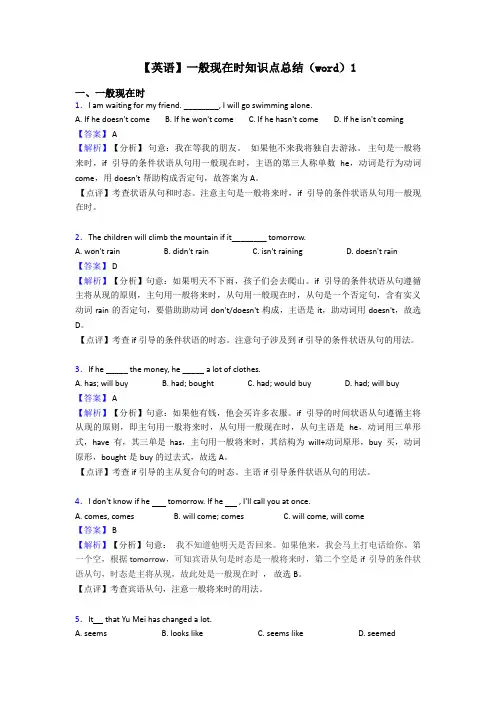
【英语】一般现在时知识点总结(word)1一、一般现在时1.I am waiting for my friend. ________, I will go swimming alone.A. If he doesn't comeB. If he won't comeC. If he hasn't comeD. If he isn't coming 【答案】 A【解析】【分析】句意:我在等我的朋友。
如果他不来我将独自去游泳。
主句是一般将来时,if引导的条件状语从句用一般现在时,主语的第三人称单数he,动词是行为动词come,用doesn't帮助构成否定句,故答案为A。
【点评】考查状语从句和时态。
注意主句是一般将来时,if引导的条件状语从句用一般现在时。
2.The children will climb the mountain if it________ tomorrow.A. won't rainB. didn't rainC. isn't rainingD. doesn't rain【答案】 D【解析】【分析】句意:如果明天不下雨,孩子们会去爬山。
if 引导的条件状语从句遵循主将从现的原则,主句用一般将来时,从句用一般现在时,从句是一个否定句,含有实义动词rain的否定句,要借助助动词don't/doesn't构成,主语是it,助动词用doesn't,故选D。
【点评】考查if引导的条件状语的时态。
注意句子涉及到if引导的条件状语从句的用法。
3.If he _____ the money, he _____ a lot of clothes.A. has; will buyB. had; boughtC. had; would buyD. had; will buy【答案】 A【解析】【分析】句意:如果他有钱,他会买许多衣服。
动词16个时态一、一般现在时1.概念:表示经常发生的情况;有规律出现的情况;总是发生的;和事实真理。
2.时间状语:Always, usually, often, sometimes, every week (day,year, month…),once a week(day, year,month…),on Sundays(on Mondays …),3。
基本结构:动词原形(如主语为第三人称单数,动词上要改为第三人称单数形式)4。
否定形式:主语 + am/is/are + no t + 其他;此时态的谓语动词若为行为动词,则在其前加don’t,如主语为第三人称单数,则用doesn't,同时还原行为动词。
5.一般疑问句:把be动词放于句首;用助动词do提问,如主语为第三人称单数,则用does,同时,还原行为动词。
6.例句:It seldom snows here。
这里很少下雪。
He is always ready to help others.他总是乐于帮助别人。
Action speaks louder than words。
事实胜于雄辩。
二、一般过去时1.概念:过去某个时间里发生的动作或状态;过去习惯性、经常性的动作、行为。
2.时间状语:ago, yesterday, the day before yesterday, last week, last(year, night,month…),in 1989,just now, at the age of 5,one day, long long ago, once upon a time, etc。
3。
基本结构:主语 + 动词的过去式或be的过去式+名词4.否定形式:主语 + was/were + not + 其他;在行为动词前加didn’t,同时还原行为动词.5.一般疑问句:was或were放于句首;用助动词do的过去式did 提问,同时还原行为动词。
【英语】一般现在时知识点梳理及经典练习(超详细)(word)一、一般现在时1.I go to school Sunday.A. can't; /B. don't; inC. can't; onD. don't; on【答案】 D【解析】【分析】句意:我星期天不上学。
在某一天用on,表示经常发生的动作用一般现在时,故选D。
【点评】考查一般现在时和介词辨析。
2.Millions of people _________ the Great wall every year.A. visitedB. visitC. will visitD. are vesting【答案】 B【解析】【分析】句意:成千万的人每年参观长城。
根据every year,可知句子时态为一般现在时,故答案是B。
【点评】考查一般现在时,注意根据时间状语确定句子的时态。
3.I think joining the English club ________ the best way to improve your English.A. areB. wasC. isD. were【答案】 C【解析】【分析】句意:我认为加入英语俱乐部是提高英语水平的最好方法。
描述客观事实用一般现在时,主语是动名词joining,谓语是单三式,故be用is,故选C。
【点评】考查时态,注意主谓一致的用法。
4.Not only Li Ming but also his parents ______ in Canada now.A. isB. areC. wasD. were【答案】 B【解析】【分析】句意:现在不仅李明,而且他的父母也在加拿大。
根据now,可知时态是一般现在时,主语是his parents,复数,故用be动词用are,故选B。
【点评】考查动词辨析,注意be动词are的用法。
5.Our Geography teacher told us that the Earth ____________ the sun.A. went aroundB. goes aroundC. is going aroundD. was going around【答案】 B【解析】【分析】句意:我们的地理老师告诉我们地球绕着太阳转。
高考总复习:一般现在时、现在进行时、一般将来时、将来进行时的用法及区别真题再现:1. (2015安徽高考)It is reported that a space station ______ on the moon in years to come.A. will be buildingB. will he builtC. has been buildingD. has been built2. (2015天津高考)Jane can’t attend the meeting at 3 o’clock this afternoon because she ______a class at that time.A. will teachB. would teachC. has taughtD. will be teaching3. (2015四川高考)More expressways _________ in Sichuan soon to promote the local economy.A. are being builtB. will be builtC. have been builtD. had been built4.(2015湖南高考)As you go through this book, you ________ that each of the millions of people who lived through World War II had a different experience.A. will findB. foundC. had foundD. have found5. (2015北京高考)—Dr. Jackson is not in his office at the moment.—All right. I________ him later.A. will callB. have calledC. call D will be calling6.(2015湖南高考)Always_______ in mind that your main task is to get this company running smoothly.A. to keepB. to have keptC. keepD. have kept7. “Life is like walking in the snow”, Granny used to say, “because every step ”A. has shownB. is showingC. showsD. showed8. Planning so far ahead ____ no sense——so many things will have changed by next year.A. madeB. is makingC. makesD. has made9. The fact that so many people still smoke in public places _____ that we may need a nationwide campaign to raise awareness of the risk of smoking.A. suggestB. suggestsC. suggestedD. suggesting10. That piece of music sounds quite familiar. Who _____ the piano upstairs?A. has playedB. playedC. playsD. is playing答案与解析:1. B。
一、写出下列动词的第三人称单数talk______forget______hope______stop______perform______play______say_____ buy______worry______fly______study_______like_______make______take______ love_______recite_______become_______come_______drive_______shine_______ leave_____wake_______ride_______write_______hike______give______see______ swim______stop______shop_______plan______get_______sit_______let_______ cut_______ run_______ relax_______ begin_______wash_______watch_______ finish______ teach______ fish_______ reach_______ go______ do_____have______ kiss______tay______try______ hiss______fix______二、用括号内动词的适当形式填空。
1. He often ________(have) dinner at home.2。
Daniel and Tommy _______(be) in Class One.3。
We _______(not watch) TV on Monday.4。
Nick _______(not go) to the zoo on Sunday。
5. ______ they ________(like) the World Cup?6。
What _______they often _______(do) on Saturdays?7. _______ your parents _______(read) newspapers every day?8。
一般现在时表示现在经常反复的动作和客观事实,一般规律。
一.构成(一)动词为Be动词:1.肯定句:be分为am, is, are,根据主语来变。
1)I am a teacher.2)He is my teacher.3)They are my teachers.4)The mountains are very high.2.否定句:在be动词后加not1)I am not a teacher.2)He is not a teacher.3)They are not teachers.4)The mountains are not very high.3.一般疑问句:要将be放在句子开头(注意句首字母大写),句尾用问号,答语用Yes,主语+be.或No,主语+be+not.如:—Are you a teacher?—Yes,I am.(—No,I'm not.)4.特殊疑问句:特殊疑问词+ be+主语+动词+其他?1)Who are you?2)What is this?(二). 动词为实义动词:当主语为非单数第三人称是句中的谓语动词为实义动词原形;当主语为单数第三人称单数的时候,谓语动词用单数第三人称形式:1.肯定句:I get up in the morning.He gets up in the morning.He and Tom run quickly.2.否定句:否定句中,要在实义动词前面加助动词do/does+not,do/does本身无意义,常与not缩写成don't(doesn't),如:I don't like vegetables.He doesn’t like vegetables.3.一般疑问句:要在句子开头加助动词Do/does,句中动词用原形,句尾用问号。
简略答语用Yes,主语+do(does).或No,主语+do(does)+not.如:(1). Do you like oranges?Yes,I do.No,I don't. (2). Does he like oranges?Yes, he does.No, he doesn’t4. 特殊疑问句:特殊疑问词+ do/does +主语+动词+其他?(1)What does he do?(2)When do you get up?二、用法(一)一般现在时表示经常性或习惯性的动作,常与表示频度的时间状语every day, usually, always, often, sometimes, on Sunday等连用。
一般现在时表示现在经常反复的动作和客观事实,一般规律。
一.构成(一)动词为Be动词:1.肯定句:be分为am, is, are,根据主语来变。
1)I am a teacher.2)He is my teacher.3)They are my teachers.4)The mountains are very high.2.否定句:在be动词后加not1)I am not a teacher.2)He is not a teacher.3)They are not teachers.4)The mountains are not very high.3.一般疑问句:要将be放在句子开头(注意句首字母大写),句尾用问号,答语用Yes,主语+be.或No,主语+be+not.如:—Are you a teacher?—Yes,I am.(—No,I'm not.)4.特殊疑问句:特殊疑问词+ be+主语+动词+其他?1)Who are you?2)What is this?(二). 动词为实义动词:当主语为非单数第三人称是句中的谓语动词为实义动词原形;当主语为单数第三人称单数的时候,谓语动词用单数第三人称形式:1.肯定句:I get up in the morning.He gets up in the morning.He and Tom run quickly.2.否定句:否定句中,要在实义动词前面加助动词do/does+not,do/does本身无意义,常与not缩写成don't(doesn't),如:I don't like vegetables.He doesn’t like vegetables.3.一般疑问句:要在句子开头加助动词Do/does,句中动词用原形,句尾用问号。
简略答语用Yes,主语+do(does).或No,主语+do(does)+not.如:(1). Do you like oranges?Yes,I do.No,I don't. (2). Does he like oranges?Yes, he does.No, he doesn’t4. 特殊疑问句:特殊疑问词+ do/does +主语+动词+其他?(1)What does he do?(2)When do you get up?二、用法(一)一般现在时表示经常性或习惯性的动作,常与表示频度的时间状语every day, usually, always, often, sometimes, on Sunday等连用。
如:I go to school at 6 every morning. 每天早上我七点去上学。
(二)一般现在时表示客观存在及普遍真理。
如:Summer follows spring. 春天之后是夏天。
The sun rises in the east. 太阳从东方升起。
注意:此种用法即使出现在过去的语境中,仍用一般现在时。
如:I learned that the earth goes around the sun when I was in primary school. 我在小学就学过地球是围绕太阳转的。
(三)一般现在时表示格言或警句。
如:Pride goes before a fall. 骄者必败。
(四)一般现在时表示目前的情况或状态。
如:I am a teacher. 我是教师。
Peter writes good Chinese but does not speak well. 彼得汉语写得不错,讲的可不行。
(五)以here, there等开始的倒装句,表示动作正在进行。
如:Here comes the bus. = The bus is coming. 车来了。
There goes the bell. = The bell is ringing. 铃响了。
在下列情况下表示将来:1. 在状语从句中用一般现在时代替一般将来时。
如:I will give it to him as soon as I see him. 我一看见他就交给他。
He will come if you invite him. 如果你请他,他会来的。
Suppose he doesn’t agree,what shall we do?假如他不同意,那怎么办?I shall do as I please. 我高兴怎么做就怎么做。
He will continue the work no matter what happens. 不管发生什么情况他都要继续这项工作。
2. 在the more…the more …(越……越……) 句型中,前者通常用一般现在时代替一般将来时,因为前者相当于条件状语从句。
如:The harder you study, the better results you will get. 你学习越努力,成绩就会越好。
3. 在make sure (certain) , see to it, mind, care, matter后的宾语从句的谓语动词用一般现在时代替一般将来时。
如:See to it that you are not late again. 注意别再迟到了。
4. 表示按计划或时间表将要发生的动作,通常有表示将来的时间状语。
如:The plane takes off at 11:30 and arrives in Shanghai at l:20. 飞机十一点半起飞,一点二十分抵达上海。
注:只限于少数动词能这样用,如begin, start, , end, finish, stop, go, come, leave, sail,arrive, return, close, open 等。
1. We often______(play) in the playgound.2. He _____(get) up at six o’clock.3. _____you ______(brush) your teeth every morning.4. What (do) ______he usually (do)______ after school?5. Danny _____(study) English,Chinese,Maths,Science and Art an school.6. Mike sometimes ________(go) to the park with his sister.7. At eight at night, she __________(watch) TV with his parents.8. ________ Mike________(read) English every day?9. How many lessons_________your classmate________(have) on Monday?10. What time_________his mother_________(do) the housework?改句子1. Do you often play football after school? (肯定回答)2. I have many books. (改为否定句)3. Gao Shan’s sister li kes playing table tennis (改为否定句)4. She lives in a small town near New York. (改为一般疑问句)5. I watch TV every day. (改为一般疑问句)6. David has got a goal. (改为一般疑问句)7. We have four lessons.(否定句)8. Nancy doesn’t run fast (肯定句)9. My dog runs fast.否定句:一般疑问句:10. Mike has two letters for him.一般疑问句:否定句:11. I usually play football on Friday afternoon.否定句:一般疑问句:划线提问12. Su Yang usually washes some clothes on Saturday. 否定句:一般疑问句:划线提问:13. Mingming usually waters the flowers every day否定句:般疑问句:划线提问14. Tom does his homework at home.否定句:一般疑问句:划线提问一般现在时练习题答案1. plays2. gets3. do brush4. does do5. studies6. goes7. watches8. does read9. does have10. does do11. do have改句子:Yes,I doI don’t have many books.Gan shan’s sisters doesn’t like play table tennis.She doesn’t live in a small village Near New york. Do you watch TV every day?Has David got a boat?We don’t have four lesons.Nanry runs fast.My dog doesn't run fastDoes your dog run fast?Does Mike have two letters for him?M ike doesn’t have two letters for him.I usually don’t play football on Friday afternooon. Do you ususally play football on Friday afternoon? Hat do you usually do on Friday afternoon.。